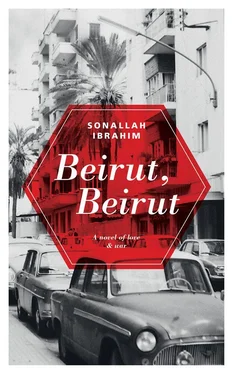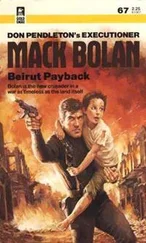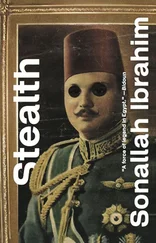He turned to Antoinette.
“How’s the film going?” he inquired.
“Good. It’s coming along,” she replied.
“Are you sure?” he asked, winking in my direction as he leaned over a small table with a row of liquor bottles on it.
He poured each of us a glass of gin, then walked to a big stereo that had a clear plastic cover on it, and asked: “Fairuz or Umm Kulthum?”
“Bach,” I said.
He laughed as he flipped through his record collection.
“This is the real reason for the failure of the Arab left. Chasing after European culture and being disconnected from the masses.”
“Bach belongs to everyone,” I objected.
He picked up a record, and said: “How about something modern, close to Bach and Arab music as well? Have you heard of Charette?”
I shook my head. He put the record on the turntable, and placed the needle on it, then went back to his seat.
Antoinette was engrossed in a conversation in French with Jacques’s wife. Jacques directed his speech toward Marwan, while pointing at a piece of paper lying on the table in front of him: “Not a single newspaper in France will publish the petition in its current form.”
Marwan’s eyes were sharply focused on him.
“Why?” the young man with the beard asked in a challenging tone.
He laughed. “Because it’s talking about the detention of several dozen leftists, while there are thousands of others being detained in Syria, from the Muslim Brotherhood and other groups. Plus, it doesn’t clearly establish responsibility. We all know that if it weren’t for the Soviet Union, the Syrian regime would collapse. The petition doesn’t point that out directly.”
Marwan bowed his head, saying: “I see your point. The wording of the petition has to be changed.”
“That’s impossible,” the young man with the beard angrily interjected.
Antoinette joined in, saying: “If you change the wording of the petition, I will withdraw my name from it.”
Jacques laughed. “You don’t have to change it,” he said. “You can do a different wording for the French text.”
I followed the conversation while listening to the music. It was quite similar to pieces played on the Arab instrument known as the qanun . But its structure was complex, and bit by bit it ascended until it was on the verge of reaching a climax, at which point it retreated to the beginning, only to begin a new attempt.
Jacques’s wife invited us to a table, laden with platters and gold-trimmed porcelain dishes. We started with soup, followed by the rest of the courses, according to the traditional sequence. We finished with coffee and cognac in the first room.
“Do you know that tomorrow will be the third anniversary of Sadat’s visit to Jerusalem?” Jacques asked, as he took a small wrapped package the size of a matchbox out of a cigar box and placed it on the table.
Marwan picked up the package and opened the thin wrapping, then brought it up to his nose and said: “This is an excellent variety.”
“I got it yesterday from Baalbek,” Jacques explained.
He took a wooden peg out of the cigar box and handed it to the film director. With a practiced motion, the director stuck it into the tip of a cigarette and began moving it in and out. He took a small lump of hashish from the package, rubbed it thoroughly between his fingers, and rolled it between his palms. Then he pushed it into the cigarette, in the empty space made by the wooden peg. He offered the cigarette to Jacques’s wife and lit it for her.
The Frenchwoman took a deep drag that made the end of it glow, extending more than a centimeter up the joint. Then she passed it to Antoinette, saying: “I was in Cairo this spring when the Israeli ambassador arrived. The sight of his car making its way across downtown, flying the Israeli flag, was truly jaw-dropping.”
“How did people react?” Marwan asked her in French.
She pouted. “There wasn’t a large crowd,” she said. “And the car was moving fast. There were lots of policemen lined up on the street.”
“If he came to Damascus, the crowds would come out to welcome him,” said the director as he flicked the wooden peg in a new joint.
“All that because they blocked your film,” Jacques added, laughing.
“What could be less important to us now than Assad and his underlings?”
I took my turn with the joint, and passed it to Jacques, who asked me: “Have you found a publisher for your book?”
“Not yet.”
“That’s how things go with Arab governments,” he offered, while giving me a scrutinizing look.
The driving rhythm of the piano was still struggling to reach the climax. It seemed to be towering over it, and was suddenly accompanied by a human moan expressing pain or pleasure or both together.
“Will you be staying long in Beirut?” I asked Jacques.
“Maybe,” he replied. “I don’t know. I’ll be going back to France in two months’ time to take part in the election campaign.”
I looked at him inquisitively.
“I’m a member of the Socialist Party,” he explained. “We have a good chance this time. If we win the elections, then Mitterand will be president.”
He laughed. “What… you don’t like Mitterand?” he added.
“Isn’t he the one that declared that Israeli aggression in 1967 was a war that Israel waged to defend itself?”
“You don’t ever want to forget? Is that it?”
“Why should we forget?”
He busied himself with accepting the joint from Marwan, taking several drags from it and offering it to me. I took two drags and passed it to Antoinette.
Her nails rested on my fingers for a moment, then wrapped around the joint and pulled it slowly through my fingers, touching me all the while.
The human moaning that accompanied the piano’s melody occurred again. A feeling of numbness spread through my legs and my perception of the music grew keener.
Antoinette announced suddenly that she had to leave, in order to get back to her house in East Beirut. Jacques’s wife offered to let her spend the night with them, but she refused, insisting that her mother would be worried if she wasn’t at home. She flashed her eyes in my direction, so I stood up, too.
“We’re headed in the same direction.”
She nodded, saying, “I’ll take you there.”
Jacques and his wife saw us to the door. As soon as we headed out into the street, the cold air hit our faces. Antoinette was unsteady and clung to my arm, resting her head on my shoulder.
“Can you drive?” she asked.
“No,” I answered. “Why?”
“It feels like everything is spinning,” she said.
“We’ll leave the car and take a taxi.”
“We won’t find one at this hour. No. I’ll drive.”
She pulled a keychain out of her purse and we got in the car. She spent a long time looking for the car key before she found it. She turned the key in the ignition and the car started off with a surprising lurch that violently jerked me backwards.
“Easy does it,” I said.
“I don’t think I can drive all the way to East Beirut.”
“So stay with me.”
I turned my attention to the road, expecting an accident any second. But the streets were empty. It wasn’t long before we crossed Hamra Street, and soon we were heading toward Wadia’s apartment.
She stopped the car in front of the building and slumped her head forward on the steering wheel, saying, “I want to sleep.”
“Come up with me and sleep at our place,” I said.
“Clearly that’s what’s going to happen.”
I stepped out of the car and waited until she got out and locked the door. Then I walked to the door of Wadia’s building and called for Abu Shakir. Moments later, he opened up to let us in.
Читать дальше












